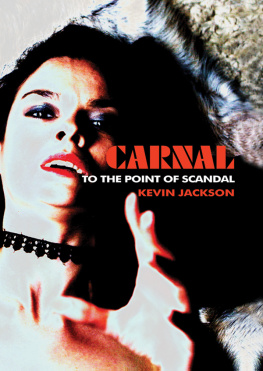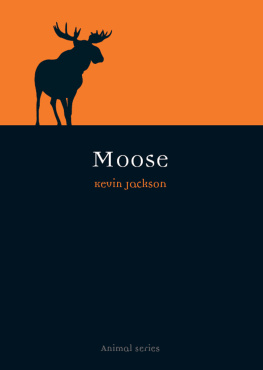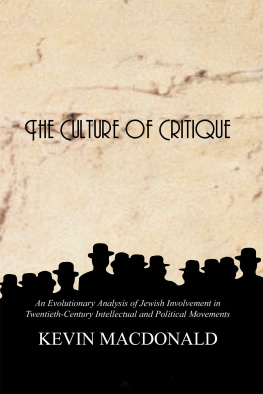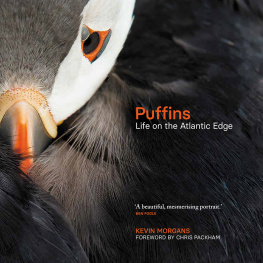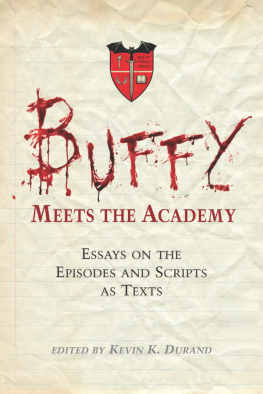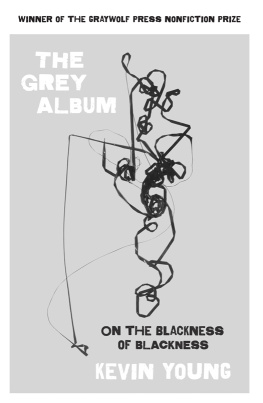
To Peter Carpenter,
Poet, Teacher, Friend
Rossellini nest pas
seulement chrtien,
mais catholique,
cest dire charnel
jusquau scandale
Jacques Rivette,
Drinking the new wine: a few notes on filming
Exquisite Corpse
Nick Lezard
Preface
I first met Kevin Jackson in the early 1980s, when, as a nervous undergraduate, I was having one of those legendarily cautious evening sherries in my director of studies rooms at university. He was an old friend of my pedagogue, and I had been told it would be worth sticking around to meet him. I was curious to meet someone who had come out of the other side of tertiary education, and I had nothing else on, as it happened; and so it was that I was treated to the sight of a grown man a very grown man, for he was over six feet tall transmitting his learning in both the syllabus and recent trends in popular culture by extemporising a rap, an art form we had only just heard of, one of whose unforgettable couplets was an obscene but not, cleverly, libellous diversion on the esteemed literary critic, Lionel Trilling. I sipped, boggle-eyed, at my warming Fino and, after getting over my initial shock at this act of enormous but strangely learned irreverence, thought: You know what? It would appear you can have some fun with this whole being-well-read thing.
Subsequent acquaintance, and then friendship, with Kevin Jackson has confirmed that here is a man who makes knowing things fun. Brain the size of a planet might have been a term coined by another writer, about a fictitious robot, but here it applies to a real, breathing human being, and is bandied in awe by all of those who know him and who have, in comparison, only very ordinary-sized brains indeed.
It is all too easy to parade ones knowledge and make other people feel small; but as Dr Jacksons output in this book will show, he is able to explore arcana and byways which the rest of us had never heard of, and transmit his enthusiasm in such a fashion as to enthuse the reader too. Which I suppose is one of the things that has excluded him, or made him exclude himself, from the standard career in academia. (Another thing: his automatic impulse never to claim credit for himself when it is due others. His generosity is both intellectual and socially practical, a cerebral corollary of his insistence of not only paying for his round, but paying for others when they are short of funds. As I have discovered to my deep gratitude many times over the years.)
I have heard it plausibly suggested that were the last 1,000 years of Western literary culture, and all of its cinematographic culture, to disappear from the earth, one of the things youd need to be able to recreate it would be the contents of his brain. Quite true; and it would moreover be a very interesting kind of Western culture: maybe a bit more vampire-heavy, more geared towards the esoteric than the canon has traditionally admitted; for although clearly a child of the Enlightenment, he has none of the disdain of the superstitious and (to use a word that he borrowed off the late John Peel, when the DJ imagined how George W Bush might mangle the word spooky) enspookulating that often comes with the territory.
It is an enormous honour to have been asked to write this preface, and humbling, too, when I consider the vast disparity between his frame of reference and mine. But I owe him some public declaration of respect, as the paper I regularly review books for will not quite properly allow its critics to praise those written by friends. And, in the matter of Dr Jackson to give him his proper title; he has managed that degree of academic respectability I am hardly sinecanistic. Read these pieces, and you, too, will become devoted to him.
Sinecanistic: disinterested, unbiased, impartial. The coinage is Jacksons (let the OED take note), and comes by way of a Latinised version of the saying I dont have a dog in this fight, and the fact that no one uses the word disinterested properly any more.
Kevin Flanagan
Introduction
I first encountered Kevin Jackson as a character in a book. Or, even though I had probably encountered his writings before (I think my initial introduction was through his work on the British film-maker Humphrey Jennings, about whom he is something of an authority), I really became aware of Kevin Jackson because of his participation in some of the walks in Iain Sinclairs London Orbital (2002). Sinclairs book is a powerful blend of travelogue, historical essay, documentary sketch (the creative treatment of actuality), and pure literary invention. Sinclair and his companions circle London by ambling around the M25, at once excavating the ghosts of suburban towns and diagnosing the decidedly unglamorous detritus of contemporary Britain. Jackson appears a little less than halfway through the book. Sinclair provides so evocative and disjointed portrait that he has to be a fictitious invention. Jackson is a journalist (autodidact, radio producer, scriptwriter, assembler of micro-books that come in alphabetically arranged units) who had wallpapered most of the broadsheets, pitching copy on everything from Bill (William) Blake to Bill Griffiths.
My first reading of Sinclair was wrong. This man is real. In person, Kevin Jackson retains something of that air of the scatterbrained student who has enrolled in too many courses. But, on page, his writing exudes a breath and confidence that is seldom matched in contemporary letters. To read Jacksons short essays, introductions, liner notes, and lists is to enter into a strange world, where the forms are often familiar enough, but the content trends toward obscurity. Jackson is a casual master of literary form, moving effortlessly between (to name a few) alphabetical lists (A Ruskin Alphabet, 2000), biography (Humphrey Jennings, 2004), the bio-graphy of a year (Constellation of Genius: 1922: Modernism Year One, 2012), and the curated selections of quotations, such as his quasi-devotional book of hours that marks the moods of the day (The Book of Hours, 2004). Jacksons Invisible Forms: A Guide to Literary Curiosities (2000) illustrates his great knowledge of written structure, including his soft spot for paratexts (those odd bits of text in books like titles, footnotes, and indexes, that often seem outside of the life-world of the book-as-object, yet still contribute heavily to its meaning). Carnal... to the Point of Scandal, the collection you hold in your hands, forms something of a running (or parallel) commentary to Jacksons other published work, and often seems like the collected realization of the material he outlines in Invisible Forms: here is a veritable multiverse of odd scribblings, encompassing forgotten British filmmakers, cartoons and comic strips, rigorous French theorists, the occult, street art, and internationally renowned photographers, presented in playful essays that are at once compulsively readable and formally sophisticated.
Kevin Jacksons work thrives on contradictions. He writes about things that offer profound weirdness and mysterious formal ambiguity, yet does so with lucidity. As these collected pieces show, he is deeply interested in the occult and voodoo, two largely irrationalist pursuits that he explores in a rational way. Despite the serious (even horrific) concerns of the some of his topics, he retains a deft sense of humour, preferring playful language and wit to heavy-handed portentousness. Like his surrealist heroes (Jennings, David Gascoyne, Buuel, Dal, Breton) he chases juxtapositions, exposing the extremes that inform the absurd tensions of everyday life and action.
Next page
